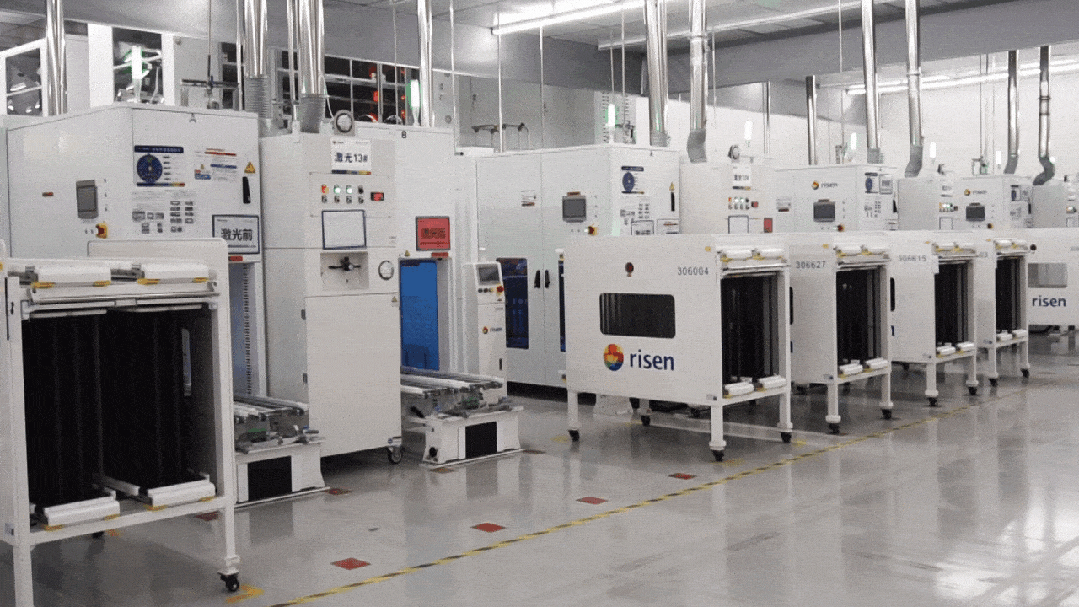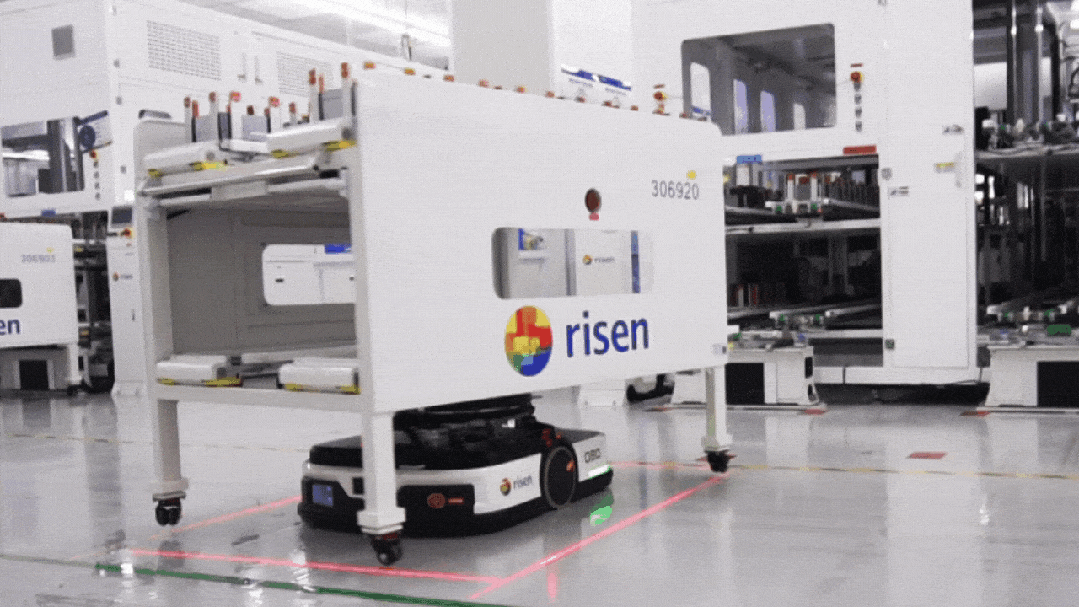With 215 AGVs for transportation and only about a dozen people for maintenance assistance, how does the intelligent workshop of a photovoltaic enterprise operate?
Previously, it was difficult to recruit and not efficient enough, but now the workshop logistics handling costs are reduced by 50%, the operation efficiency is increased by 30%, and the equipment does not stop for 7*24 hours, and how is this done?
Risen Energy Co., Ltd. is a globally leading new energy enterprise, consistently ranked in the top ten since 2018, with products exported to over 50 countries and regions worldwide. To drive the digitalization and greening of its high-efficiency battery and photovoltaic component project in Chuzhou, Anhui, Risen Energy united Colibri Technologies and Tencent Cloud to develop the intelligent logistics solution. This solution enables seamless integration of hundreds of automated devices with different protocols into a unified management, scheduling, and execution platform, leveraging advanced algorithms to facilitate the transformation and upgrade of the photovoltaic industry.

Busy AGV
Entering the battery workshop of Risen Energy’s high-efficiency battery and photovoltaic component project, you can see AGV carts busy working. These flat “little robots” with omnidirectional wheels, about 30cm high, shuttle automatically between different areas of the workshop, lifting shelf carts, and supplying and unloading materials to machine equipment.
“In our battery workshop, the materials are battery cell baskets, each weighing about 10 kilograms. One AGV can transport 10 baskets at a time,” explained by Zhang Tao, Business Manager of Intelligent Manufacturing at Risen Energy. The battery workshop can produce up to 2.2 million battery cells per day, with 650 shelf carts and a total of 215 AGVs working in the workshop. “Whenever a piece of equipment needs materials, an AGV transports the baskets. Once the process is completed, the basket are moved to another device for the next process.” It is understood that there are 13 processes in the workshop, with 11 being handled by AGVs.
Before the AGVs were used, these shelf carts were manually handled. Because it’s a cleanroom environment, workers had to wear special clothing, shoes, masks, hats, and gloves to shuttle the carts around the workshop, which was very labor-intensive. “In a million-level workshop, a person would have to handle about 20 tons of baskets in a day,” said Zhang Tao. After using AGV handling, only a dozen people are needed for on-site operation and maintenance in the workshop, and the human labor intensity is greatly reduced.
“During peak production periods, there’s an urgent demand for frontline workers, and recruiting efforts are intense,” said Shan Dan, Director of Process and Information Center at Risen Energy. “With AGVs increasing workshop efficiency, freed-up personnel can be flexibly reassigned to other positions, maximizing overall workforce efficiency.”
With over 200 automatic transport vehicles transporting materials in the workshop, in addition to requiring stable and reliable automatic transport, navigation, and driving functions, how to command them is the core of the entire system. “For example, which AGV to assign to transport materials to a piece of equipment, which route to take to get there, all require strong algorithms for scheduling and control, otherwise, it can lead to equipment idling or delayed material delivery, inefficient use, or even downtime affecting production capacity.”
Ouyang Liang, Head of Digitalization for Photovoltaic Manufacturing at Risen Energy, drew a comparison, “AGVs are like online car-hailing, and the baskets in the equipment are like passengers. With many passengers needing online car-hailing, you need a platform brain to schedule which car picks up which passenger.”
Therefore, through cooperation with Tencent Cloud and Ruilian Zhizao under Colibri Technologies, Risen Energy jointly developed the “AGV Intelligent Scheduling System,” which integrates production line equipment with institutions, shelves, buffers, AGVs, and other equipment, achieving convergence of workshop logistics and intelligent distribution for multiple tasks and multiple machine positions, completely replacing high-intensity manual handling with AGVs, ensuring uninterrupted 7*24 hours’ workshop production and efficient operation of workshop equipment.
“There are 9 lines in the workshop, everything is new- the workshop, the AGVs, the equipment. How to make them organically combine and seamlessly connect for intelligent production depends on the AGV Intelligent Scheduling System,” said Huang Husheng, Head of Intelligent Manufacturing at Risen Energy. This intelligent system has sub-second data exchange and processing capabilities, “When to dispatch vehicles, where to pick up and deliver materials, when to place those, all undergo precise logical calculations by algorithms.”

How to Cultivate the “Smart Brain”
Currently, in Risen Energy’s production workshops, the “AGV Intelligent Scheduling System” has integrated automation equipment from 20 different protocols into a unified management platform, managing over 200 AGVs for automatic production and transportation. This achieves the optimal allocation of resources and task assignments, resulting in a 50% reduction in workshop logistics handling costs and a 30% increase in operational efficiency. The “Smart Factory” has achieved efficient operation. Through real-time monitoring and data analysis of the production process, it also improves production quality, stability, and safety.
Empowering New Energy with “Digitization”
In recent years, with the gradual advancement of “peak carbon emissions and carbon neutrality,” clean energy is gradually replacing traditional energy sources, and the installed capacity of photovoltaic is continuously increasing, leading to a growing production demand. The production process of photovoltaic cell modules is complex, involving multiple stages such as issuing, loading, transportation, and circulation. The high standards of the production process also have strict requirements for material placement, not allowing for errors or non-standard operations. Therefore, photovoltaic enterprises have put forward higher requirements for intelligent production.

For Risen Energy, as market demand and performance grow rapidly, its own digitalization and green transformation are becoming increasingly urgent. “In the increasingly competitive industry landscape, batteries and component products with high performance and efficiency are one of the core competitiveness factors that differentiate products in the market.”
However, due to the large number of automated equipment purchases and significant differences in product types, manufacturers, and software protocols, there are information silos between systems, making it difficult to achieve efficient unified networking and management. Next, Risen Energy will continue to collaborate with Tencent Cloud, Colibri Technologies, and others to deeply integrate digital technology with the photovoltaic scenario, providing replicable and referable new sample for the digital development of the photovoltaic industry cluster.











